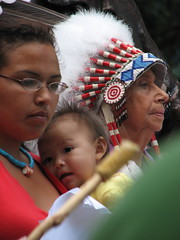 this week, prime minister stephen harper will issue an official apology about the abuse that happened during canada’s apartheid time, when for decades, first nations (aboriginal) children were taken away from their families and boarded in residential schools where they were to be made into white people. more often than not, on top of the trauma of being ripped from their families and thrown into a different culture, these children then also encountered the most atrocious physical, sexual and emotional abuse.
this week, prime minister stephen harper will issue an official apology about the abuse that happened during canada’s apartheid time, when for decades, first nations (aboriginal) children were taken away from their families and boarded in residential schools where they were to be made into white people. more often than not, on top of the trauma of being ripped from their families and thrown into a different culture, these children then also encountered the most atrocious physical, sexual and emotional abuse.
we are starting a truth and reconciliation commission, and i sincerely hope it will bring healing.
for today, i’d like to bring to you the voices of some first nations sites.
on native unity, there is something written by kevin annett, a former united church minister. he can come across as pretty radical but i have to say that much of what i’ve read rings pretty true with me and my first nations friends and acquaintances. i also met him in person a few years ago, we had a great conversation, and he seemed he had his head screwed on right. check it out for yourself:
residential school atrocity – why an apology is wrong, and deceptive: bringing humanity to bear on the residential school atrocity
rend your hearts, and not your garments (joel 2:17)
imagine for a moment that your own child goes missing and never comes home. years pass, and one day, the person responsible for your child’s death is identified, but he evades arrest and imprisonment simply by issuing to you an “apology” for your loss. he even speaks of seeking “reconciliation” with you.
wawatey news, a first nations online news site, talks about the selection of justice harry laforme to head the commission:
justice harry laforme will be objective in carrying out the mandate of the truth and reconciliation commission (TRC), says nishnawbe aski nation grand chief stan beardy.
“revealing the truth and showing the history of the era … are key to the success of the commission,” beardy said. “it was important to find the right person to lead us through this process. he is an aboriginal person with lots of experience. he’s the right person.”
assembly of first nations national chief phil fontaine agreed.
“i can think of no one better than justice harry laforme, a mississaugas of new credit first nation band member, to chair the truth commission,” fontaine said. “not only is he a proud first nations citizen, he is an outstanding jurist and a compassionate and understanding person.”
frinally, some thoughts from rodney merasty, a former teacher from pukatawagon in manitoba, and now resident of curve lake first nation, in ontario:
in a true reconciliation, “indians would have returned the respect for our heritage, respect for our peoples role in society, and a return of indian self-esteem and pride in ourselves. let us move towards attempting to restore the ‘indian family’ to what it was before the government confiscated our children. a healthy family is what was taken away from us with the advent of the residential school system.”
merasty said, “it is not enough to think about reconciliation for just the living survivors of the residential school but reconciliation to correct the damages that are still manifesting themselves today within a very disillusioned and broken down family. in order to do justice to the children of the residential schools we must spend time and money on correcting the long term damage that continues to this day.”
he noted, “our people always communicated and shared history, family values, culture and stories through word of mouth orally. when our children were taken away from us they took away our ability to continue our tradition and culture. children were no longer around to teach and train in the familiar ways. then, in turn, children were abused in every way imaginable and close to 50% of them died (murdered) in residential schools.”
merasty said the ones that were ‘lucky’ enough to survive were left to live in a world where the only thing they had to share with their children (generations of today) was an inheritance of dysfunctionalism, “so this vicious cycle continues in many ways.”
he said, “so you can see and understand why reconciliation is so much more then doling out money to survivors and their families; reconciliation is looking at the long term damage that was done; and instituting measures and steps that will at the very least reverse the trends of dysfunctional living by many of our people in our little indian reserves.”
image by grant neufeld
